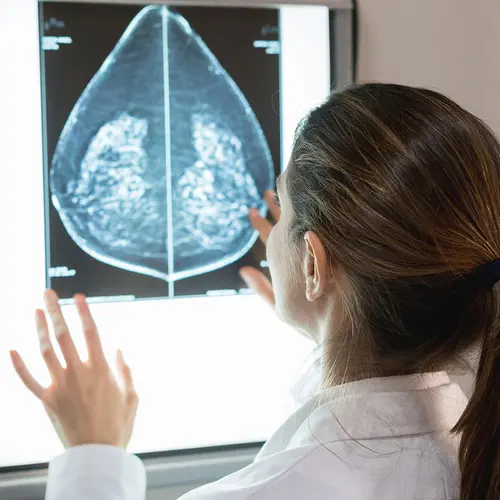The tens of trillions of microorganisms living and working in your gut -- called your microbiome -- may hold clues to preventing, treating, and surviving many diseases, including breast cancer.
“The microbiome shows important differences in people with breast cancer and people without breast cancer,” says Alice Police, MD, Westchester regional director of breast surgery at Northwell Health Cancer Institute in New York. But it’s unclear whether these changes came before breast cancer or the other way around. Experts also don’t know if there’s a way to change someone’s microbiome to improve breast cancer outcomes or even prevent the disease, but that’s the hope.
What Is the Microbiome?
“I like to define it as a collection of microorganisms that live in and on us,” explains Nadim Ajami, MD, executive director of the Program for Innovative Microbiome and Translational Research at The University of Texas MD Anderson Cancer Center in Houston. It’s the bacteria, fungi, parasites, and viruses in your gut and elsewhere that are so numerous and so important, many experts consider them to be like another organ or even a second brain. In total, they may weigh as much as 5 or 6 pounds.
The microbiome in your gut is the best known, but it’s not the only one. There are universes of tiny organisms all over your body, including your skin, urine, and yes, your breast and even breast milk. Most of these critters are “good” and are heavily involved in keeping our immune system in shape to fight off invaders, Ajami says. The good organisms also take up space that, if left vacant, might be occupied by bad players.
When something upsets the balance -- a condition called dysbiosis -- trouble can follow in the form of long-term health conditions, including cancer. Dysbiosis also drives the inflammation that’s behind many diseases.
In general, a healthy microbiome is a diverse microbiome, especially in the gut. “The higher the number of bacteria, the better it is for health,” Ajami says.
Stress, physical activity, some medications, sleep, and especially diet can all change the microbiome, says Alicia A. Romano, a registered dietitian and spokesperson for the Academy of Nutrition & Dietetics. The typical Western diet, for instance, full as it is of saturated fats and refined sugar, can lead to dysbiosis. So can obesity, according to a 2020 study.
The Gut Microbiome and Cancer
Researchers have known for some time about the link between cancer and organisms such as viruses and bacteria. For example, the human papillomavirus (HPV) can cause cervical and other types of cancer. Helicobacter pylori bacteria contribute to stomach cancer. But communities of organisms can also be involved in things like whether or not you get cancer and how you respond to treatment, Ajami says.
The part of the gut biome known as the estrobolome may explain at least part of the link to breast cancer. It has bacteria that can break down, or metabolize, estrogen so that it is expelled from your body. Estrogen fuels about 70% of breast cancers. Obesity is also linked with dysbiosis and with more estrogen production. “The more estrogen you have, the more likely you’re going to stimulate the breast tissues to divide," says Balazs I. Bodai, MD, director of the Breast Cancer Survivorship Institute at Kaiser Permanente in Sacramento, CA. “That’s the beginning of cancer.”
“We know from studies that the gut microbiome does have a lot of control over estrogen levels," Police says. “We just don’t know how to make it go one way or another with any pill or food.”
A study in mice found that changing the microbiome resulted in inflammation in breast tissue, which led to more aggressive breast cancer. Other studies have found that gut bacteria may affect how well certain treatments work.
Prebiotics and Probiotics
Probiotics are the living organisms in our gut that contribute to good health while prebiotics, Romano explains, “act as food for the gut microbiota.” Probiotics are most fond of foods (prebiotics) in the form of fiber, found in the healthy things you hear so much about: fruits (like bananas), vegetables (such as onions or asparagus), and whole grains. You can also get prebiotics from garlic.
Probiotics themselves can be found in fermented foods such as yogurt, sauerkraut, and kimchi.
Prebiotics and probiotics together keep your gut microbiome balanced, and the best way to get them is through your diet, especially a high-fiber one.
“We have great data to suggest that a lower-fat, plant-based diet and exercise can reduce the risk of breast cancer,” Police says.
Meat, which is often raised with antibiotics, may be a major factor in dysbiosis, Bodai says. “They wipe out your gut,” he explains. “Dairy, especially cheese, may also be harmful because it has high levels of estrogen.” Meat and dairy once a week is probably OK, he says. “Just don't make it your staple food.”
Many people have turned to the prebiotic or probiotic supplements that fill store shelves. These have no proven benefit, although certain types may be helpful in restoring your microbiota after a round of antibiotics.
The evidence is still unclear on whether prebiotic or probiotic supplements have an effect on breast cancer risk or survival, Romano says.
If you decide to try a probiotic supplement, make sure it has at least 20 to 30 billion bacteria. If not, Bodai says, you're probably not getting an adequate dose. You may want to talk to your doctor before starting it.

